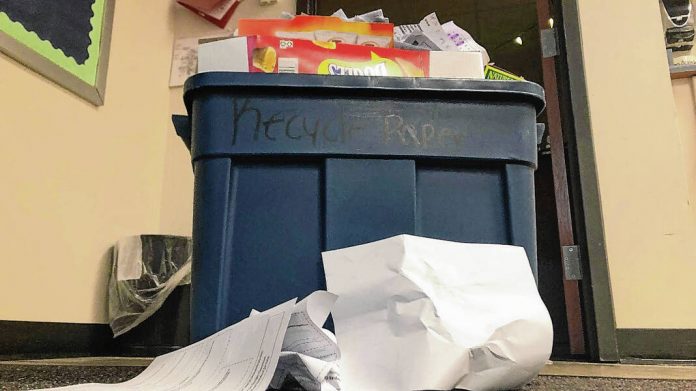Have you ever wondered why there is no comprehensive recycling program in our school? There was recycling at school last year, and there is at Custer Baker, but students are noticing that this year, their teachers’ recycling bins aren’t being emptied. Sure, some teachers recycle on their own, but what happens to the majority of recyclable waste in our building?
FCMS 8th grade science teacher, Ally Sever, talked about how much plastic is going to waste here at FCMS. Plastic silverware or containers of fruits and veggies at lunch adds to the buildup of waste in this school. Come to think of it, most of our lunch is actually held in plastic packaging. Furthermore, consider after-school sporting events and the amount of waste produced from concession snacks. Sadly, it all just gets piled into normal trash and improper ways of decomposition.
When we don’t correctly recycle, the waste could end up in a landfill, polluting our water, or even destroying natural habitats. In fact, only 5% of plastic is recycled out of the 46 million tons that are generated annually in the U.S. While this school doesn’t recycle the waste correctly, it’s contributing to the problem.
Recycling has been available in the past, so what caused the program to go away? Jeff Sewell, the Director of Operations in the Franklin Community School Corporation, gave an inside scoop on why recycling isn’t available in our schools this year. Sewell says, “I understand we tried offering recycling for plastics and cans in the past, but unfortunately, people put their trash in the recycling containers, and then the recyclables often ended up being thrown away.”
Becky Zehr used to run a recycling program with her Essential Skills students where they would collect and empty the recycling bins. She explained, “We would see various things [non-recyclables] and then they would have to dig through that, and that’s just not sanitary at all.” The students’ improper use of waste management could easily be a key reason why there is no longer recycling.
As previously stated, you can see how not recycling correctly can contribute greatly toward global pollution. It’s important to recycle correctly, and so to stop being part of the problem, students must agree to discard waste correctly if schools were to get a recycling system back.
Although, an important question is if the school even values recycling? Because if not, that could be why it’s not available. On this thought, Sewell agreed that recycling is essential and that it should be practiced in all schools. He continued, explaining the difficulties of installing recycling in the school systems, but admitting that he’s been looking into ways we could start a program up again. “I attended a webinar (an online seminar) a couple of weeks ago on school recycling programs. A company in Indianapolis is offering a recycling service that is more flexible in terms of accepting mixed loads of recycling,” he enthused, “however, I’m still working through the same logistic challenges of keeping trash out of the recycling containers and managing the additional workload of collecting the recyclables.”
Zehr explained that her recycling program with her students had to close due to the school’s teaming system for the classes. The school created an environment where students stick to classes within a certain hallway and have schedules for certain times. The afternoon period called “Focus,” which is basically homeroom, was installed into all schedules, stripping the time for students to collect recycling. “My kids got much more involved in other classes and then classes within our class, so I couldn’t find a period that I could actually get them out to do it.” She added, “I was disappointed that we couldn’t, […] because they really do enjoy it.”
She realized a large problem is that she has no clue if anyone picks up recycling at the school. She explained that she’s gone outside to find the recycling dumpsters completely full. “I think recycling is an issue because it gets full in the teacher classrooms, and then it gets full in the bins, then it gets full out there and it just feels like it’s overflowing.” Even in the school’s attempts to recycle, who is there to pick it up?
One of the largest problems in the school is custodian staff shortages. With no time during the day for students to collect trash, people would have to hope that custodians would do it. Zehr explained that when she has time during the day, she tries to have her students collect the recycling, but it’s hard to do so. “We hope that someone is taking them out,” she says, “the custodians have done that in the past but I know they’re short staffed and they can’t really do that either.”
Zehr went on to explain her desire to start up a recycling program during Focus, but she needs students who want to participate. She revealed that there used to be a fund supplied for the previous recycling program that was never used. “We get money to recycle, the way I understood it. So, if a group wants to take that on, they could possibly get some of the proceeds of that.”
In order to obtain a recycling program in the school once again, students need dedication. Although, along with the students, a dedicated system of adults is needed to help. This school needs a stable program with dedicated workers and a school that’s ready to take on this environmental challenge. It needs ideas for change and people ready to fight to clean our polluted environment.
Any students who are interested in bringing recycling back to this school, or have ideas on how to keep the waste organized, please email [email protected] with your thoughts! Let’s do our best to save our Earth, one school at a time.
This story is by Taylor McHenry, of the Paw Post, the Franklin Community Middle School newspaper.





